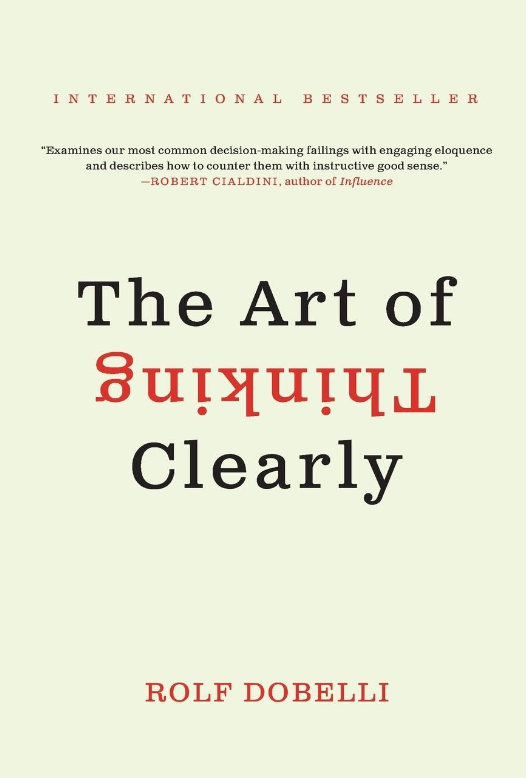
Note: This article is based on the first chapter only. Therefore, one should not judge the entire book by reading this article alone.
Today I will talk about a very good book, The Art of Thinking Clearly. The book is written by Rolf Dobelli and is a million-copy bestseller. In this book, the author talks about the problem of listening to successful people’s stories.
What we do all the time. If I said we love to talk about successful people, we listen just to them, we read about them in newspapers, magazines, and so on. Even when we watch television or anything like that, we just watch successful people. The funniest part is when we enter our home, our parents talk about successful people. They tell us Mr. X and Mr. Y can do everything, why can’t you?
Also, when we sit with our friends, they always discuss successful people’s stories. All around us, every time, we only amaze thinking of success. This is all about a simple matter. But when I tell you, do you notice we do that thing every time?
Maybe you simply give me answers, yes. But you never know what survivorship bias is and what the problem is in listening to and talking about successful people’s thinking about them?
Who is the book for?
Most of the time, we all think randomly. Most of us can’t do anything in an organized way and also can’t think about anything in an organized way. When you read this book, you will learn about a lot of terms. This book has a total of 100 chapters. But today I will talk only about the first chapter.
There is no reason to be afraid of 100 chapters because each chapter is only two to three pages long.
What is survivorship bias?
Survivorship bias is that we are always listening to stories of successful people. We are talking about those who are telling stories of successful people. As a result, an overconfidence layer is placed on our minds without knowing it. That is, we always come across situations where people are only talking about successful people.
The tendency to overestimate one’s success rate by listening to the stories of the successful without judging one’s ability is called survivorship bias.
Suppose thousands of people died on a battlefield and only 10 people came back unscathed after winning the war. And their identity is known—they are the ones who went to fight. Now, when they came back after winning the war, then our young generation, who have not the age to go to war, thought about them. Different media, TV channels are promoting so much about them.
The people who won the war are so socially acceptable. Then we also have to go to war. What is life if not to go to war? They think that man has come back successfully, why can’t I? But they never think that there is a high possibility that they too will die in the war. No one wants to listen to failure.
Let me explain the matter better with an example. Suppose there is a race of 100 people, and at the end of the race, just 3 people are selected 1st, 2nd, and 3rd. They are awarded. Well, they were called on various talk shows, but no one is talking about the remaining 97 people who have failed. No one wants to hear about them. No one is doing news about them.
When we do something, there are more failures than successful people. We don’t hear the stories of the failures because no journalist is ever interested in printing the stories of the failures. No media is ever talking about the people who are not successful. No. Or you don’t want to listen to them, and I don’t want to listen to them. This is a common thing between us.
But have you thought about how heavy the team of 97 people is? And the successful people are only 3. There is no problem with that. It is natural that we will talk about the successful three people. But the effect of the success of those three people will start influencing our activities, overstimulating our expectations of success.
When we fail—which is more likely—we will have to muster even more strength to handle the pain of that failure. If we had considered the possibility of failure for most people, we would be more prepared. Knowing failure is possible helps you keep going toward success.
Choose 10 successful businesses and 10 failed businesses
Suppose, when you enter any business, you see 10 successful businesses and 10 failed businesses. Try to understand why the 10 who succeeded, succeeded, and why the other 10 failed. Do thorough research.
When you research both successful and unsuccessful people, you gain a clearer idea of where mistakes are made and what makes success possible. Then, you can better organize yourself before starting a business or anything else. You can create a better plan.
If we start something without our survivor bias, then the chances of suffering are extremely low because you already know that you can fail. So, to avoid it, we need to listen to the stories of failures. If we don’t listen to the stories of failed people, we will never know about the failures that could have happened

I loved as much as you will receive carried out right here. The sketch is attractive, your authored material stylish. nonetheless, you command get got an impatience over that you wish be delivering the following. unwell unquestionably come more formerly again since exactly the same nearly a lot often inside case you shield this hike.